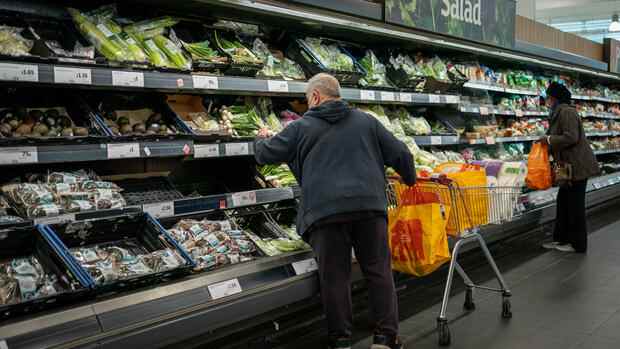London In Great Britain, concerns are growing about the social consequences of the sharp rise in energy prices. When the regulatory authority Ofgem adjusts the state price cap for electricity and gas to the sharp rise in market prices on Friday, economists believe that many households and companies will no longer be able to cope with this price shock without emergency state aid. “Disaster looms this winter as soaring energy bills could cause serious physical and financial damage to families across the UK,” warns Jonny Marshall of think tank Resolution.
Philippe Commaret, chief executive of EDF, the French energy company with a heavy stake in the UK, fears half of the country’s 28 million households could fall into “energy poverty”. This means that these families have to spend more than ten percent of their disposable household income on electricity and gas.
Energy costs are the biggest driver of inflation, driving price increases to more than 10 percent in July. Citibank predicts that inflation will reach 18 percent early next year.
The hope that Britain could decouple itself from the looming doom of the energy crisis in the face of a European gas market has proved to be an illusion. In March, energy costs for gas and electricity for an average household were just under £1,280 (€1,510) a year.
Top jobs of the day
Find the best jobs now and
be notified by email.
The bill has since increased by more than 50 per cent to £1,971. On Friday, Ofgem’s watchdogs will again adjust the state price cap to the sharp rise in market prices and will probably increase it by another 80 percent.
Energy costs could rise to more than £6,000 by April next year, according to a new forecast from energy agency Auxilione. This means that prices have almost quintupled within a year. Ofgem director Christine Farnish recently resigned because she felt the regulator was putting too much of a strain on consumers and not enough on businesses.
The consumers are boycotting the payments
70 charities in the UK have now declared a “national energy emergency”. Consumers are reacting to the price shock, among other things, by calling for a boycott of payments for energy bills, which is now being supported by almost 114,000 Britons. Supermarket chain Iceland is offering customers interest-free grocery loans to help make ends meet.
However, many small and medium-sized companies are also in need, and their energy costs have also multiplied. The energy bills for many businesses could be four times higher this winter than they were a year ago, according to calculations by market researchers Cornwall Insight.
“We need help that is comparable to that during the pandemic,” says Shevaun Havilan, Director of the British Chambers of Commerce. She demands a temporary reduction in VAT on energy and non-repayable emergency aid.
However, consumers are at the center of the public debate. “Many households can no longer afford that,” says Keith Anderson, head of the energy group Scottish Power, with a view to the costs of electricity and gas. He has proposed freezing energy prices at current levels for two years and closing the gap to significantly higher market prices with a government-guaranteed loan program that energy companies can then use to cover their costs.
The two-year price cap is said to cost around 100 billion pounds and would therefore be more expensive than the state short-time work aid of almost 70 billion during the corona pandemic. Anderson is said to have already discussed his plan with Economics Minister Kwasi Kwarteng and received positive feedback.
The Labor Party also wants a price cap
The loans are to be repaid either from tax revenue or directly from consumers over a period of 20 years through a surcharge on their bills after the end of the energy crisis. Economists criticize that the plan leads to deadweight effects in wealthy households and does not provide any incentive to save energy.
Nothing will change politically in Great Britain until September 5th. Only then will the new head of the ruling Conservative Party, and thus Boris Johnson’s successor, be announced as Prime Minister.
No alms: The favorite for the post of prime minister prefers tax cuts.
(Photo: Reuters)
Liz Truss, currently British Foreign Secretary and favorite for the top job, has so far refused to make any concrete aid pledges. She relies on tax cuts.
However, these would hardly help low-income families because they pay little or no tax. “Even Truss’s proposal to temporarily remove the green climate surcharge from energy bills would not help much,” says Peter Levell, economist at the Institute for Fiscal Studies (IFS).
Truss’ rival Rishi Sunak proposes suspending VAT on energy and targeting help to the poorest households. Labor Party leader Keir Starmer is also proposing a price cap, but wants to cover most of the costs by extending the Conservative government’s windfall tax.
So far, only the major British oil and gas producers such as Shell and BP have been affected by the special tax of 25 percent, and their profits are now taxed at 65 percent. In the drawer of the Treasury, however, are plans to ask the electricity producers to pay.
More: The British are showing what a country can do wrong when inflation is high
